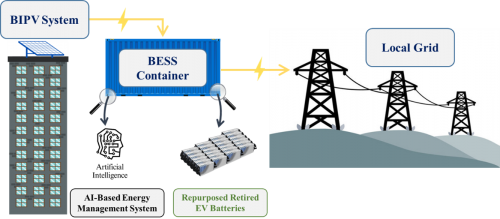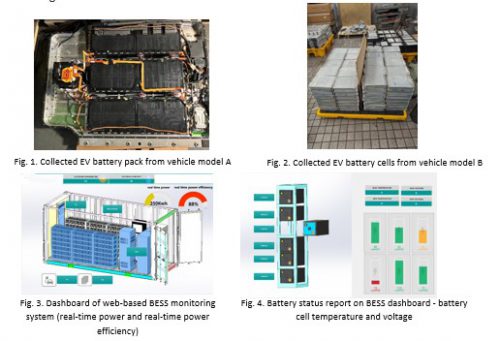
Vehicle electrification and the rapid deployment of renewable energy are crucial for a low-carbon transition. The intermittent nature of renewable energy sources brings challenges to conventional power grid operations. Battery energy storage systems (BESS) offer a promising solution to tackle this challenge and facilitate the realization of 100% renewable energy networks. Lithium-ion batteries, commonly used in BESS, can be integrated with power distribution grids to provide ancillary services, such as power smoothing, power gird stabilization, backup power supply, etc. Lithium-ion batteries also power electric vehicles (EVs). However, retired EV batteries can become hazardous waste and pose environmental impacts without proper treatment. In this context, this R&D project develops a BESS using the retired EV batteries infusing Battery-to-Grid (B2G) technology with the aim of enhancing local grid resilience, increasing access to renewable energy and promoting the transition to a sustainable, low-carbon future. This project advocates the Triple-S principle: Sustainable, Smart and Social equity.
- Sustainable: Firstly, a holistic sustainable energy solution is formulated. We integrate the retired EV battery-powered BESS with a building integrated photovoltaics system to fully harness renewable energy. Secondly, the retired EV batteries are directly collected at our partnered automotive service centers and undergo a repurposing process, adhering to the circular economy principle and reducing the demand for raw lithium sources required for the production of BESS. The battery repurposing and BESS development processes strictly follow the ISO14001 standard. Thirdly, the BESS system provides B2G service, strengthening grid stability and facilitating renewable energy shifting.
- Smart: Repurposing retired EV batteries from different EV models is challenging because they have varying conditions in terms of state of health (SoH), state of charge (SoC), and battery configurations. To overcome these technical challenges, we develop a smart battery management system (BMS). Our BMS incorporates state-of-the-art AI models that enable real-time tracking of battery status, active cell balancing, and diagnostic reporting. Besides, we also integrate an innovative energy management system into the BESS, featuring energy harvesting and consumption prediction module and the load monitoring and forecasting module in order to provide high-quality B2G ancillary services. Furthermore, the BESS is equipped with web-enabled features, allowing end users to conveniently monitor the status of the BESS at their fingertips.
- Social equity: This R&D project places a strong emphasis on fostering social equity through a collaborative partnership between the government, industry, universities, and research institutions. Firstly, this project is supported by the Hong Kong government, demonstrating a shared commitment to achieving a low-carbon and smart city vision. By aligning with the government’s sustainable development goals, this project ensures that its deliverables can be widely applied in areas such as green energy and smart grid. Secondly, as the demand for EVs continues to grow, we can expect a proportional increase in the number of retired EV batteries in the near future. By repurposing these batteries into BESSs to support smart grids, this project not only addresses the unfavorable environmental impacts of retired EV batteries but also unlocks new global market opportunities. Thirdly, this R&D project fosters stronger connections between local recycling firms, automotive service providers, and universities. By engaging these stakeholders, this project creates a collaborative ecosystem that promotes knowledge sharing, innovation, and the systematic framework for repurposing retired EV batteries. In doing so, it empowers the younger generation by providing postgraduate-level research opportunities, equipping them with the skills needed to contribute to the green economy.
With the Triple-S principle, this project not only proposes smart and sustainable solutions to address technological challenges but also actively promotes social equity by leveraging partnerships and nurturing the next generation of researchers and professionals in the field.
Project Highlight, Impacts, and Performance Measurement
(Project Highlights) The project aims to repurpose retired EV batteries and create a sustainable BESS with BIPV technology, supported by B2G and AI. It has received funding from The Hong Kong Government’s Green Tech Fund and the project execution is monitored by the Environmental Protection Department. The project’s details are displayed on the Green Tech Fund website to raise awareness among the general public and local/international enterprises regarding environmental protection.
The innovative concept goes beyond existing EV battery repurposing projects by incorporating advanced technologies and sustainability features. These include an integrated BIPV system for onsite renewable energy generation, AI-powered modules for safe and efficient operation, smart grid integration and energy management services, and a user-friendly web-based dashboard for monitoring and management. The project represents a significant advancement in EV battery repurposing and integrated energy solutions.
The project aligns with multiple future development trends, including vehicle electrification, renewable energy, smart grid, AI technology, circular economy, and sustainable practices. It follows the aforementioned Triple-S principle, exemplifying the harmonious relationship between technology and nature in the digital, data-driven age. Future project extensions may incorporate vehicle-to-grid technology and expand the use of retired EV battery-based BESS to store energy from wind and tidal power farms.
(Performance Measurement) The project is an ongoing initiative with a duration of 36 months. As of the end of April 2024, the design of the BESS, BMS, and PV system has been completed, along with the collection of retired batteries and identification of testing methods. The subsequent stages include cell reorganization, system development, and trial testing.
The key goals of the project include:
- BESS storage capacity: 120 kW / 180 kWh
- 141 repacked EV battery cells in the BESS cabinet
- Each repacked cell is associated with one smart BMS module
- Collected EV batteries are from 2 different EV models
- Robust fire suppression system with 1 fire extinguisher and multiple temperature and smoke sensors
- Fan cooling system with 2 air conditioners of 2 kW each
- EV charging outlet on BESS system with a rated power of 7 kW
- Advanced AI-based energy management system with 1 web portal and 2 AI models for load monitoring, forecasting, and battery condition monitoring and prediction
- Photovoltaic system with an array area of 50 m2 and 13 kW of DC peak power
The project follows international standards for battery collection, transportation, treatment, repurposing, installation, and testing. These standards include IEC 62485-1 and IEC 62485-2 for battery recycling, UL 9540 for BESS design, and IEEE 1547 for interconnecting distributed resources. The design is intended for international application, ensuring compliance with global standards.
The project’s cost-effectiveness is enhanced through partnerships with automotive service providers who donate retired EV batteries, reducing transportation and disposal costs. The BESS-BIPV system operates self-sufficiently using solar energy and provides ancillary support to local smart grids, emphasizing energy savings and reducing operating costs and energy waste.
The project’s carbon reductions stem from three aspects:
- Harnessing renewable (solar) energy through the BIPV system with zero emissions, resulting in a lower carbon footprint compared to coal-fired power stations.
- Shortening the reverse logistics chain for battery recycling, reducing long-haul transportation and carbon emissions.
- Repurposing retired batteries reduces carbon emissions and avoids the release of hazardous chemicals/gases associated with traditional recycling processes.
The project’s achievement scales align with electric, mechanical, energy, and civil engineering metrics, ensuring attainable and quantifiable goals. The Environmental Protection Department of Hong Kong closely monitors the project’s progress to ensure cost-efficient execution and superior deliverable qualities. Testing and trial data will be available in later stages of the project, around October 2025. The estimated completion date is March 31, 2025.
(Policy Consistency and Project Impacts) Upon completion, the retired EV battery-based BESS-BIPV system will be operated by EcoPark HK in Tuen Men, Hong Kong. The project aligns with the Hong Kong Smart City Blueprint 2.0 and Hong Kong’s Climate Action Plan 2050, emphasizing waste management, energy efficiency, and green buildings. The project’s contributions and impacts span multiple areas, including:
- Advancing knowledge in developing an advanced battery management system for retired batteries with varying states of health (SoH), states of charge (SoC), and configurations.
- Pushing the boundaries of sustainable and intelligent energy storage system design.
- Introducing innovative B2G services powered by repurposed EV batteries and showcasing capabilities in harnessing renewable energy.
- Providing smart grid support that benefits local residents in the long run.
(Just Transition) The collaborative nature of the project involving government, industry, universities, and research institutions indicates the knowledge sharing, innovation, and capacity building among participating entities. This collaboration could contribute to building resilience in firms and institutions by fostering partnerships, promoting research and development, and enhancing expertise in the renewable energy, energy storage, and smart grid sectors.

